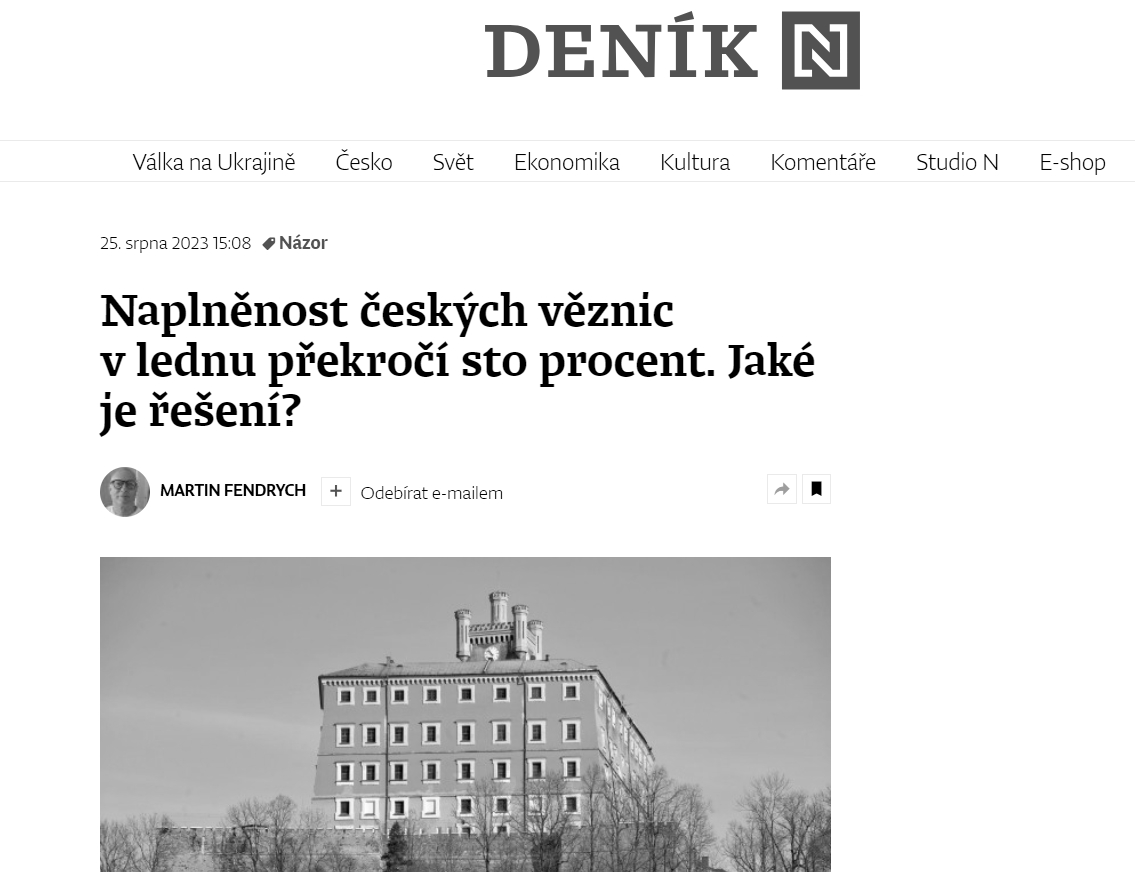Commentator Martin Fendrych wrote a commentary for Deník N about the current Czech prison system and its current problems. In several places, he quotes the evaluation report of our project.
Comment by M. Fendrych: The occupancy rate of Czech prisons will exceed 100 percent in January. What’s the solution?

The commentary titled “The occupancy rate of Czech prisons will exceed 100 percent in January. What’s the solution?” was published on August 25, 2023 on the Deník N website.
At the beginning of the text, the author states that a modern state can be recognized, among other things, by its prison system and how it works with convicted men and women. Whether the prison resembles a warehouse of people whom the system perceives as unnecessary, unsuitable, or dangerous (referred to as “warehousing”), or whether it is able to help them return to life without bars and without recidivism.
He then describes the current problems of the Czech prison system and refers to, among other things, the evaluation report of our project and the recent report of the Czech Helsinki Committee on the Czech prison system.
In other parts of the commentary, he writes, among other things:
In its new evaluation report, the #PráceZaMřížemi project explains that the return of those who have been released to society is complicated by a number of problems, but the key ones are unaffordable housing and the difficulty of finding employment. Inmates also do not know if and when they will be released on parole, so it is difficult to get help from social workers after leaving prison. They return to another part of the country where the support does not follow them. Prison workers and NGO professionals are overburdened and unable to keep up. This is how it is described in the report of the project trying to introduce the case management method (social work striving for a unified approach of various professionals and services, the result of which is the stabilization of clients and their return to society).
(…)
The author of the report, Jiří Mertl from Charles University in Prague, says: “Securing housing is the most common order with which clients enter our project and systematic support in the form of case management. After their release, the most frequently available rooming houses are those with which the accompanying social workers have had a very negative experience. They perceive it as a very unsuitable environment for those released, due to the frequent presence and availability of addictive substances, violence, and the overall low quality of this housing.”
He describes a frightening phenomenon: Released prisoners find work, for example, in large-scale production and assembly plants in industrial zones in the Mladá Boleslav and Plzeň regions, and so on. The workloads there are sometimes so brutal that people will not meet them unless they help themselves with drugs. “I have spoken with many social workers who describe how alcohol is routinely distributed at the rooming houses ‘officially’ from the position of the rooming house’s foreman. Often, even methamphetamine is available, where it is associated with work, to meet the standards, to be able to work sometimes three hundred hours a month.” Hell.
The Czech prison system does not function as a correctional facility, a system that gives convicts a chance to change their lives, to live to the fullest, not to return to crime. The #PráceZaMřížemi project attempts to break prison patterns and offer systemic care for convicted drug users even after release. By the end of June, 327 people had participated in the project, of which 143 continued approximately one week before their release from prison, and 75 continued the program one week after their release. Twelve clients have successfully completed the project so far, which means that they have remained in the project for six months after their release. I would add that we now have about 17,500 prisoners in the country.
This is a fraction of the total, but there is an open path that makes sense and could lead repeat offenders out of repeated returns to prison. At the same time, however, we see that the entire outdated prison system must be changed, modernized and humanized.
You can read the full commentary on the Deník N website (the full version of the text is accessible to subscribers only).








